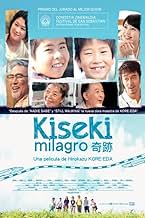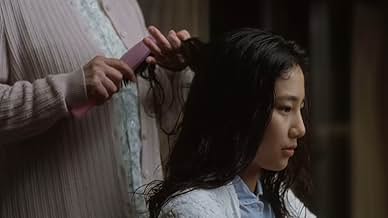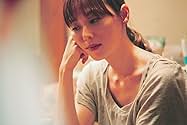IMDb-BEWERTUNG
7,3/10
8314
IHRE BEWERTUNG
Füge eine Handlung in deiner Sprache hinzuTwelve-year-old Koichi, who has been separated from his brother Ryunosuke due to his parents' divorce, hears a rumor that the new bullet trains will precipitate a wish-granting miracle when ... Alles lesenTwelve-year-old Koichi, who has been separated from his brother Ryunosuke due to his parents' divorce, hears a rumor that the new bullet trains will precipitate a wish-granting miracle when they pass each other at top speed.Twelve-year-old Koichi, who has been separated from his brother Ryunosuke due to his parents' divorce, hears a rumor that the new bullet trains will precipitate a wish-granting miracle when they pass each other at top speed.
- Auszeichnungen
- 5 Gewinne & 9 Nominierungen insgesamt
Kôki Maeda
- Koichi
- (as Koki Maeda)
Ôshirô Maeda
- Ryunosuke
- (as Oshiro Maeda)
Nene Ôtsuka
- Nozomi (Mother)
- (as Nene Ohtsuka)
Empfohlene Bewertungen
Lighthearted but profound Japanese family drama about two young brothers forced to live apart after the separation of their parents. The more sensitive Koichi (Koki Maeda) lives with his mother and grandparents in Kagoshima under the shadow of the active Sakurajima volcano, while the happy-go-lucky Ryu (Ohshirô Maeda) has remained in Fukuoka with their slacker musician father. Koichi longs for them to be reunited and when he hears of a magical rumour that when two super-fast Bullet trains pass each other they create enough cosmic energy to grant your wish, he and his friends set out to put things back the way they were.
The suburban tale of a troubled family told with a touch of fantasy and adventure draws obvious parallels with Spielberg, and it is more than worthy of the comparison. Director Hirokazu Koreeda elicits two incredibly natural performances from the boys (real life brothers) and indeed all of the young cast – in the scenes where they're hanging out he has seemingly turned the camera on some local school friends, their relationships seem so genuine. Koichi and Ryu's story is interspersed with those of their friends and family, all of whom have their own struggles and aspirations. Be it their grandfather's desire to bake a successful sponge cake, or Koichi's friend's dream of marrying the beautiful school librarian, every character – no matter how minor – is portrayed as a real person with their own hopes and fears. As a result it is constantly engrossing, establishing an affinity with everyone on screen and also allowing some fantastically warm funny moments to emerge from the characters themselves. Despite its concentration on character over narrative, and its general unpredictability, the film still has a mainstream tone and is more than capable of cultivating a wide, varied audience.
A quiet natural film that avoids obvious melodrama and sentimentality, it retains a thoughtful depth about what it is to dream and hope for that which is just out of reach. As is often the case with the most affecting cinema its power lies in what the viewer brings to it from their own lives, and how much they are willing to invest in the film. With no obvious moral or message, it has the potential to be interpreted in many ways. A philosophical yet thoroughly accessible film that effortlessly gets under the skin.
The suburban tale of a troubled family told with a touch of fantasy and adventure draws obvious parallels with Spielberg, and it is more than worthy of the comparison. Director Hirokazu Koreeda elicits two incredibly natural performances from the boys (real life brothers) and indeed all of the young cast – in the scenes where they're hanging out he has seemingly turned the camera on some local school friends, their relationships seem so genuine. Koichi and Ryu's story is interspersed with those of their friends and family, all of whom have their own struggles and aspirations. Be it their grandfather's desire to bake a successful sponge cake, or Koichi's friend's dream of marrying the beautiful school librarian, every character – no matter how minor – is portrayed as a real person with their own hopes and fears. As a result it is constantly engrossing, establishing an affinity with everyone on screen and also allowing some fantastically warm funny moments to emerge from the characters themselves. Despite its concentration on character over narrative, and its general unpredictability, the film still has a mainstream tone and is more than capable of cultivating a wide, varied audience.
A quiet natural film that avoids obvious melodrama and sentimentality, it retains a thoughtful depth about what it is to dream and hope for that which is just out of reach. As is often the case with the most affecting cinema its power lies in what the viewer brings to it from their own lives, and how much they are willing to invest in the film. With no obvious moral or message, it has the potential to be interpreted in many ways. A philosophical yet thoroughly accessible film that effortlessly gets under the skin.
Siblings try to find a way out of the circumstances imposed on them by their parents. Their lives are turned upside down when their parents divorce and custody arrangements split them up. Twelve-year-old Koichi ends up with his mother Nozomi, and they move in with her parents in a small village where she gets a job at a supermarket. Koichi's younger brother Ryunosuke, meanwhile, moves in with his dad Kenji, a struggling musician who can't hold on to a day job. The brothers miss each other and want to bring their parents back together, and when they hear of an urban legend that if two people make the same wish at the same time while watching two bullet trains pass one another, the wish will immediately come true, they decide this is the way to reunite the family.
It has its funny moments and it reminds you of your childhood (if you are more that 25 years old haha). The concept idea is a good one and the performance its quite good too. I was expecting way more to say the true, but everyone has its own tastes. Worth watching? 1 time, yes.
It has its funny moments and it reminds you of your childhood (if you are more that 25 years old haha). The concept idea is a good one and the performance its quite good too. I was expecting way more to say the true, but everyone has its own tastes. Worth watching? 1 time, yes.
Kouichi (Kouki Maeda) and Ryunosuke (Oushiro Maeda) who's parents are separated and now lives apart in Fukuoka, and Kagoshima hears about a rumor that if you see the meeting of the first bullet trains from Fukuoka and Kagoshima, a miracle will happen. Wishing that the miracle will be the reunion of their parents, they set out to see the meeting of the two trains, while involving their friends, teachers, and adults around them.
Child prodigy stand up comic team Maeda-Maeda performs the role of Kouichi, and Ryunosuke. Director Hirokazu Koreeda originally had a different plot for the story, where a girl living in Fukuoka, goes to see the two trains crossing each other on the track, meets a boy from Hakata and love story ensues. But upon seeing Maeda-Maeda at the audition, he changed the story to that which involves the two brothers. The project was a promotional campaign for the opening of the Kagoshima route of Japan Railways bullet train line. They brought the project to director Koreeda, and he accepted.
Very common story that involves nothing but the life of few children, but is made extraordinary by the direction of Koreeda, and the performance of Maeda brothers. Observation of people in common life, and attention to detail is extraordinary, and can only come from the eyes of a genius. I can see why Koreeda is regarded so highly as a director. I'd say only few directors can take a theme like this, and create a truly intriguing movie like this one.
In reality it is virtually impossible to pinpoint where the two trains will meet on the track, so the story is purely fictional.
It may be difficult to see all the inner workings of this movie at a first glance, but it is worth the time to sit in and really enjoy the performance.
Child prodigy stand up comic team Maeda-Maeda performs the role of Kouichi, and Ryunosuke. Director Hirokazu Koreeda originally had a different plot for the story, where a girl living in Fukuoka, goes to see the two trains crossing each other on the track, meets a boy from Hakata and love story ensues. But upon seeing Maeda-Maeda at the audition, he changed the story to that which involves the two brothers. The project was a promotional campaign for the opening of the Kagoshima route of Japan Railways bullet train line. They brought the project to director Koreeda, and he accepted.
Very common story that involves nothing but the life of few children, but is made extraordinary by the direction of Koreeda, and the performance of Maeda brothers. Observation of people in common life, and attention to detail is extraordinary, and can only come from the eyes of a genius. I can see why Koreeda is regarded so highly as a director. I'd say only few directors can take a theme like this, and create a truly intriguing movie like this one.
In reality it is virtually impossible to pinpoint where the two trains will meet on the track, so the story is purely fictional.
It may be difficult to see all the inner workings of this movie at a first glance, but it is worth the time to sit in and really enjoy the performance.
Pre-teen brothers Ryunosuke and Koichi (played by real-life brothers Ohshirô and Koki Maeda) are forced to live apart when their separated parents end up residing in opposite ends of Kyushu. Ryunosuke broods on this, while Koichi seems more at ease with the arrangements. Together, the brothers hatch a plan to meet at the point where the new shinkansen trains pass each other, after hearing an urban legend that the vortex created by the speed of the trains has the power to grant wishes. Meanwhile, granddad tries out a new sponge cake recipe, a friend of Koichi's has acting ambitions, and Dad is writing a new song.
The usual Kore-eda themes of fractured families and kids finding magic in a flawed universe are present, but by the director's own standards this is a much lighter, almost sugar-coated engagement with those themes. There is the signature naturalistic, engrossing performances from the child actors, with Ohshirô as Ryunosuke especially impressive in his conflicted, caring attempts to be re-united with his brother. Koki is more of a one-note outing, required to be relentlessly upbeat, which he does superbly. The scene where he moves his mother to tears on the phone plays on this astutely. Forcing two young brothers to live apart for their own selfish ends could be represented in darker tones, even as abuse, but Kore-eda keeps it all light and humorous, through the simple trope of having the children be sensible and down-to-earth, and the adults, especially the bickering parents, petty and immature. The sub-plots, involving sponge cake and acting ambitions, are so removed from the main story strand that they give the film an episodic, slightly meandering feel when they pop up. Ultimately they are distracting, making the story busier than it needs to be. They also stretch the running time to over two hours. While some will delight in spending time with such engaging children, the film felt flabby to me after the 90-minute mark. The ending, while admirably avoiding sentimentality, takes too long to come around.
Such is Kore-eda's stature that a host of A-listers pack the minor roles giving them more gravitas than normal. Jô Odagiri as the musician father, Kirin Kiki as the grandmother, and Hiroshi Abe as a disciplinarian teacher ply their day-shifts admirably.
There is a lot to enjoy in I Wish, but lacking the damning social critique of Nobody Knows, and the acerbic scalpel on family life of Still Walking, this is Kore-eda choosing to crowd please rather than stretch himself.
The usual Kore-eda themes of fractured families and kids finding magic in a flawed universe are present, but by the director's own standards this is a much lighter, almost sugar-coated engagement with those themes. There is the signature naturalistic, engrossing performances from the child actors, with Ohshirô as Ryunosuke especially impressive in his conflicted, caring attempts to be re-united with his brother. Koki is more of a one-note outing, required to be relentlessly upbeat, which he does superbly. The scene where he moves his mother to tears on the phone plays on this astutely. Forcing two young brothers to live apart for their own selfish ends could be represented in darker tones, even as abuse, but Kore-eda keeps it all light and humorous, through the simple trope of having the children be sensible and down-to-earth, and the adults, especially the bickering parents, petty and immature. The sub-plots, involving sponge cake and acting ambitions, are so removed from the main story strand that they give the film an episodic, slightly meandering feel when they pop up. Ultimately they are distracting, making the story busier than it needs to be. They also stretch the running time to over two hours. While some will delight in spending time with such engaging children, the film felt flabby to me after the 90-minute mark. The ending, while admirably avoiding sentimentality, takes too long to come around.
Such is Kore-eda's stature that a host of A-listers pack the minor roles giving them more gravitas than normal. Jô Odagiri as the musician father, Kirin Kiki as the grandmother, and Hiroshi Abe as a disciplinarian teacher ply their day-shifts admirably.
There is a lot to enjoy in I Wish, but lacking the damning social critique of Nobody Knows, and the acerbic scalpel on family life of Still Walking, this is Kore-eda choosing to crowd please rather than stretch himself.
In Kagoshima, the boy Koichi (Koki Maeda) lives with his mother Nozomi (Nene Ohtsuka) in the house of his grandparents. Koichi misses his younger brother Ryunosuke (Ohshirô Maeda) and his father Kenji (Jô Odagiri), who live in Fokuoko, and he dreams on his family coming together again. One day, Koichi overhears that the energy released by two bullet trains passing by each other would grant wishes and he invites his two best friends, Tasuku (Ryôga Hayashi) and Makoto (Seinosuke Nagayoshi), to travel to the point of intersection of the two trains. Koichi also tells his plan to Ryunosuke that invites his three best friends to join him. Soon the seven children arrive to the meeting point in the journey of discoveries.
"Kiseki" is a simple and sensitive tale of loss of innocence of children that need to face reality instead of immature and naive dreams. The come of age of Koichi that accepts the divorce of his parents and of Megumi (Kyara Uchida) that decides to move to Tokyo to become an actress and Makoto that decides to bury his dog are clearly are depicted in the story. Ryunosuke is still a child and believes that his wish is the responsible for the chance his father and his friends will have in their career of musicians.
The direction of Hirokazu Koreeda and the performances are top-notch and the movie shows landscapes of the countryside of Japan that are unusual in Japanese features. My vote is eight.
Title (Brazil): "O Que Eu Mais Desejo" ("What I Desire the Most")
"Kiseki" is a simple and sensitive tale of loss of innocence of children that need to face reality instead of immature and naive dreams. The come of age of Koichi that accepts the divorce of his parents and of Megumi (Kyara Uchida) that decides to move to Tokyo to become an actress and Makoto that decides to bury his dog are clearly are depicted in the story. Ryunosuke is still a child and believes that his wish is the responsible for the chance his father and his friends will have in their career of musicians.
The direction of Hirokazu Koreeda and the performances are top-notch and the movie shows landscapes of the countryside of Japan that are unusual in Japanese features. My vote is eight.
Title (Brazil): "O Que Eu Mais Desejo" ("What I Desire the Most")
Wusstest du schon
- WissenswertesShinkansen wanted to make a movie to promote their bullettrains. They approached Koreeda, an avid trainlover. He came up with this movie.
- VerbindungenFeatured in A Story of Children and Film (2013)
- SoundtracksKAGOSHIMA OHARA BUSHI
Written by Quruli
Performed by Quruli
Top-Auswahl
Melde dich zum Bewerten an und greife auf die Watchlist für personalisierte Empfehlungen zu.
- How long is I Wish?Powered by Alexa
Details
- Erscheinungsdatum
- Herkunftsland
- Offizielle Standorte
- Sprache
- Auch bekannt als
- Phép Màu Giữa Đời Thường
- Drehorte
- Produktionsfirmen
- Weitere beteiligte Unternehmen bei IMDbPro anzeigen
Box Office
- Bruttoertrag in den USA und Kanada
- 145.808 $
- Eröffnungswochenende in den USA und in Kanada
- 10.919 $
- 13. Mai 2012
- Weltweiter Bruttoertrag
- 2.371.548 $
- Laufzeit
- 2 Std. 8 Min.(128 min)
- Farbe
- Sound-Mix
- Seitenverhältnis
- 1.85 : 1
Zu dieser Seite beitragen
Bearbeitung vorschlagen oder fehlenden Inhalt hinzufügen



















